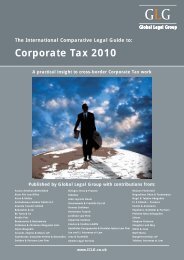BMR Edge-Tax & Regulatory Mont - BMR Advisors
BMR Edge-Tax & Regulatory Mont - BMR Advisors
BMR Edge-Tax & Regulatory Mont - BMR Advisors
Create successful ePaper yourself
Turn your PDF publications into a flip-book with our unique Google optimized e-Paper software.
(Determination of Value Rules), 2006 (‘Valuation Rules’). The taxpayers submitted<br />
that Rule 5(1) of the Valuation Rules, in as much as it provides for including all<br />
expenditure or costs incurred by the service provider in the course of providing the<br />
taxable service in the taxable value of services, travels beyond the mandate of Section<br />
67 of the Finance Act. Accordingly, the taxpayers submitted that it is only the value of<br />
service that is to say; the value of the consulting engineering service rendered by the<br />
taxpayer to NHAI that can be brought to charge and nothing more and thus, Rule 5(1)<br />
of the Valuation Rules is ultra vires Section 67 of the Finance Act.<br />
On analysing relevant provisions of service tax laws and after going through the above<br />
submissions, the HC held that:<br />
<br />
<br />
On a combined reading of section 66 and section 67 of the Finance Act it is clear<br />
that in determining the taxable value only consideration actually paid as quid pro<br />
quo for the service can be brought to charge. The expenditure or costs incurred by<br />
the service provider in the course of providing the taxable service cannot be<br />
considered as the gross amount charged by the service provider ‘for such service’<br />
provided by him;<br />
Therefore, the provisions of Rule 5(1) to the extent it seeks to include expenses<br />
incurred for providing a taxable service in the value of taxable service, exceeds<br />
the mandate of section 67 of the Finance Act.<br />
<br />
While the Central Government has powers under section 94 of the Finance Act to<br />
make rules, such power to make rules cannot exceed the scope of levy envisaged<br />
under the Finance Act/ charging section.<br />
Therefore, Rule 5(1) of the Valuation Rules, to the extent it provides for inclusion<br />
of expenditure incurred in the course of provision of taxable service, in the value<br />
of taxable service, is ultra vires the provisions of section 66 and 67 of the Finance<br />
Act.<br />
Intercontinental Consultants and Technocrats Pvt Ltd v UOI (2012-TIOL-966-HC-<br />
Del-ST)<br />
Whether premium received by the insurance company is inclusive of service tax or not<br />
would depend on the terms of contract pursuant to which insurance policy is executed<br />
and the conduct of the company. Non-disclosure of real prices at which the service is<br />
provided along with prevailing statutory taxes and levies amounts to unfair trade<br />
practices pursuant to which taxes cannot be recovered from the customers at a later<br />
stage<br />
The taxpayer was a public limited company engaged in providing life insurance and<br />
other similar services. With respect to a 20 year life insurance policy sold to their<br />
customers, the taxpayer, till the fourth instalment, collected premium without any<br />
charge of service tax. However, in the fourth instalment, the taxpayer charged service<br />
tax in addition to the premium. The same was objected by one of the customers. Not<br />
satisfied with the explanation of the taxpayers, the customer moved to ‘Insurance<br />
Ombudsman’ with the complaint. The Insurance Ombudsman accepted the case of<br />
the customer that the premium receivable should be inclusive of tax.<br />
Aggrieved by the same, the taxpayers preferred an appeal with the Kerala HC wherein<br />
the taxpayer contended that it is the duty of the service recipient to pay tax. The<br />
customer did not dispute the liability of service tax. However, he contended that the<br />
premium stated to him by the taxpayer at the time of canvassing the policy was<br />
inclusive of service tax and other levies.<br />
The appeal was dismissed on the grounds that it depends on the terms of the contract<br />
pursuant to which insurance policy is executed whether premium is inclusive of service<br />
tax or not. Policy document and the premium receipts issued for first three annual<br />
premiums did not contain statement that it did not include statutory taxes and levies.<br />
Further, the taxpayers did not claim service tax till fourth instalment, which<br />
communicated through their conduct that the premiums were inclusive of service tax.<br />
It was more so since policy was issued when service tax was in force and premium<br />
was fixed by the taxpayer taking into account the nature of business, viability and<br />
profit. In the event the premium offered didn’t include the service tax, the taxpayers, in<br />
the normal course, should have disclosed the same.<br />
Further, the HC held that non- disclosure of real price at which the service is provided<br />
along with prevailing statutory taxes and levies amounts to misleading vis a vis price,<br />
which is an unfair trade practice under Section 2(r)(l)(ix) of Consumer Protection Act,<br />
1986. Without such disclosure of the duties and levies at the time of transaction, the<br />
taxpayers are not entitled to claim them from customer at a later stage during course of<br />
continuing service.<br />
Max New York Life Insurance Co Ltd v Insurance Ombudsman [2012-28-STR-453<br />
(Ker)]<br />
Back office activities like preparation of tax returns, co-sourcing services, analyzing<br />
client data and calculating estimates of tax amount would not qualify as Information<br />
Technology services even though they are performed by using computer programs
















